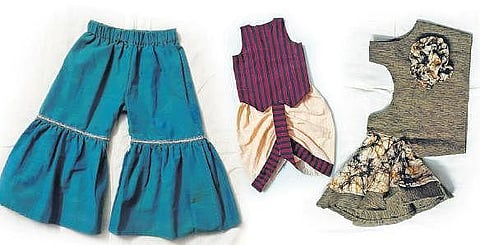

TIRUPPUR: One afternoon, while brainstorming for a college assignment, Jyothi had an idea. As a little girl, she’d dreamt of making clothes for babies. And this, it seemed, would be her chance. As her online class progressed, she spoke up, proposing to make babies’ clothes out of handloom fabrics.
Over a month of hard work followed. And now, 20-year-old Trilochanaa Jyothi has made five sets of babies’ clothes from hand-spun fabrics Kalamkari, Batik, Bandhani, and two varieties of Bengal muslin for infants under the age of one.
The idea was to produce soft and safe clothes for babies, Jyothi, a student of apparel fashion designing, explains. “We’re used to modern fabric, but handloom fabric is different – it’s made by skilled artisans using manually operated looms or weaving machines. The output is soft and breathable, ideal for babies,” she points out, displaying the clothes she tailored.
“Moreover, no artificial elements are used. The weavers use organic and naturally-procured colours. Henna, indigo, turmeric and pomegranate, among others, are used to dye the yarn, preventing skin irritation in newborns,” Jyothi adds.
While clothes made of handloom fabrics aren’t rare these days, what sets Jyothi’s work apart are her intricate designs and eye for detail. “Since babies’ skin is sensitive, I had to be extremely cautious. The wrong colour could cause the child stress; or the baby could be allergic to organic colours. I did thorough research and interacted with several mothers to learn their preferences. But what was most challenging was sourcing the right fabric of the right colour. Besides, it’s expensive,” the youth points out.
Jyothi’s professor Bhoopathi Vijay lauds her for her work, and explains that designing apparel for babies requires utmost attention to detail. “There shouldn’t be any metal, sharp zippers or loose buttons, as they increase the risk of choking. When Jyothi came to me for the project, I believed the output would be great; and she delivered as expected,” Vijay said.
A native of Chennai, Jyothi completed a diploma in ‘fashion fit and style’ from NIFT Chennai, and is now a second-year student at Tiruppur’s NIFT-TEA Knitwear College. Tiruppur, being one of Tamil Nadu’s largest hubs for textile emporiums, is caught between a pandemic and the country’s drive to boost self-reliance, and sees a ray of hope when students like Jyothi invest time and energy in such projects.
Such students are approached by business owners and government-run outlets, among others, for permission to sell their designs. But only a handful of such projects get picked, Bhoopathi points out. “Since the college sponsors the projects, only the most eccentric and innovative ideas are chosen. These projects also help students secure placements,” he adds.
Since babies’ skin is sensitive, I had to be extremely cautious. The wrong colour could cause the child stress; or the baby could be allergic to organic colours